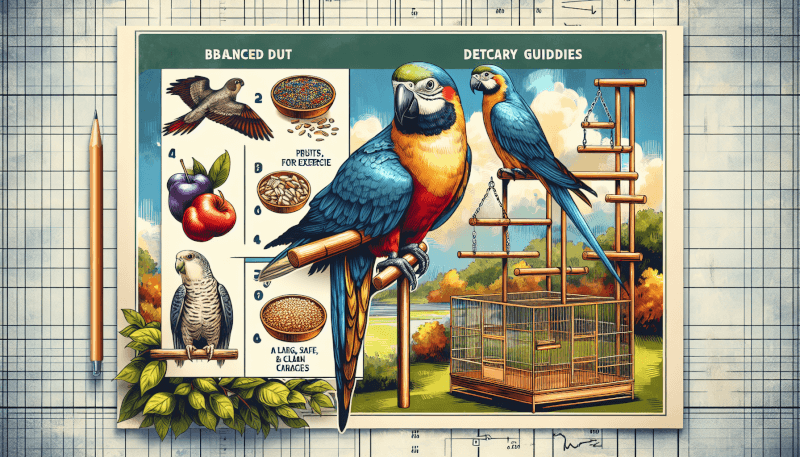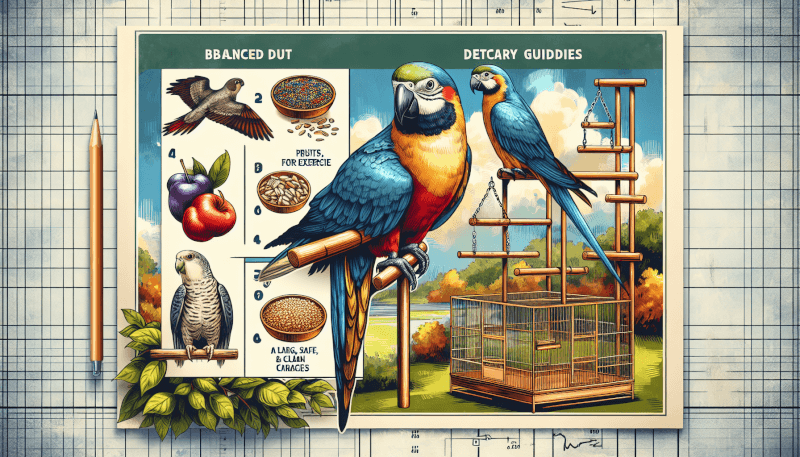Avian weight management is an essential aspect of caring for birds, whether they are your beloved pets or part of a professional aviary. Understanding the key considerations for maintaining a healthy weight in birds is crucial to their overall well-being. This article explores the factors that contribute to avian weight management and provides practical tips for maintaining optimal weight in your feathered companions. Whether you are a seasoned bird owner or a newbie in the avian world, this guide will equip you with the knowledge and tools to ensure your birds stay in tip-top shape.

Understanding the importance of avian weight management
Avian weight management plays a crucial role in the overall health and well-being of birds. Maintaining a healthy and optimal weight is vital for various reasons, including flight performance, breeding success, and overall quality of life.
The impact of weight on avian health
Weight has a significant impact on the health of birds. Being overweight or underweight can lead to a range of health problems and reduce their lifespan. Excessive weight can put stress on their joints, leading to joint diseases such as arthritis. It can also increase the risk of cardiovascular diseases and other metabolic disorders. On the other hand, being underweight can weaken their immune system, making them more susceptible to infections and diseases.
The role of weight in flight performance
Weight plays a critical role in the flight performance of birds. Being overweight can hinder their ability to fly efficiently and may even restrict their flight altogether. Birds need to maintain an optimal weight to ensure their wings can support their body weight and allow for efficient and agile flight. Weight management is especially crucial for bird species that rely heavily on flight for survival, such as birds of prey or migratory birds.
The relationship between weight and breeding success
Weight also plays a significant role in the breeding success of avian species. Female birds often require a certain body condition to go through the reproductive process successfully. Being either underweight or overweight can lead to reproductive issues, such as difficulty in laying eggs or inadequate incubation and care for the offspring. Maintaining an optimal weight is crucial for ensuring successful breeding and healthy offspring.
Determining optimal weight for different avian species
Determining the optimal weight for different avian species involves considering various factors that influence their natural body condition.
Factors influencing optimal weight
Factors such as age, size, sex, and natural habitat contribute to the optimal weight for each avian species. Different bird species have unique physiological and metabolic needs, which determine their natural body condition. Avian experts and veterinarians consider these factors when determining the optimal weight range for specific bird species.
Adapting weight management strategies based on avian species
Weight management strategies need to be tailored to the specific needs of each avian species. These strategies involve providing appropriate diets, monitoring food intake, and ensuring adequate physical activity. For example, birds that have a naturally higher metabolic rate may require more frequent feedings with smaller portion sizes, while others may benefit from a controlled feeding schedule to prevent excessive weight gain.
Considerations for captive vs. wild avian populations
When implementing weight management strategies, it is essential to consider the context in which the birds are living. Captive avian populations may have different dietary requirements and exercise opportunities compared to their wild counterparts. Captive birds may require additional environmental enrichment activities to keep them physically and mentally stimulated. Providing a balance between optimal weight management and natural behaviors is crucial for the well-being of both captive and wild avian populations.
Methods of measuring avian weight
Accurately measuring avian weight is essential for effective weight management. Several methods can be used to measure bird weight, depending on the accuracy required and the bird’s tolerance for handling.
Utilizing precision scales
One of the most accurate and commonly used methods of measuring avian weight is by using precision scales specifically designed for small animals. These scales can provide precise weight measurements and are often used in veterinary clinics and research facilities. Birds are placed on the scale, and their weight is recorded.
Estimating weight through body measurements
In some cases, it may not be practical or possible to weigh a bird using a scale. In such situations, avian experts may use body measurements as a way to estimate a bird’s weight. This method involves measuring the bird’s body length, beak length, wing length, and other specific measurements. By comparing these measurements to established weight-length ratios specific to the species, experts can estimate the bird’s weight.
Technology-mediated weight measurement techniques
Advancements in technology have provided alternative methods for measuring bird weight. Some avian experts use non-invasive methods such as imaging techniques to estimate weight. These techniques involve taking detailed images of the bird and using software algorithms to calculate the weight based on the measurements. These methods can be useful for birds that are difficult to handle or stress easily.
Understanding the causes of weight gain in avian species
Weight gain in avian species can be attributed to various factors, including dietary factors, a sedentary lifestyle, and certain medical conditions.
Dietary factors and overfeeding
One of the primary causes of weight gain in birds is overfeeding or providing an unbalanced diet. Birds that have access to an abundance of food or are regularly fed high-calorie treats can easily consume more calories than they require. This excess energy is stored as fat and leads to weight gain over time. It is important to provide birds with a well-balanced and portion-controlled diet to prevent excessive weight gain.
Sedentary lifestyle and lack of exercise
Birds that have limited opportunities for physical activity and exercise are more prone to weight gain. Lack of space, confinement in cages or aviaries, and absence of environmental enrichment activities can contribute to a sedentary lifestyle. Regular exercise and physical stimulation are essential for maintaining a healthy weight and overall well-being in avian species.
Medical conditions contributing to weight gain
Certain medical conditions can also contribute to weight gain in avian species. Hormonal imbalances, metabolic disorders, and genetic predispositions can affect a bird’s weight regulation mechanisms. It is crucial to identify and address any underlying medical conditions that may be contributing to weight gain to ensure effective weight management.

Developing effective weight loss plans
When birds are overweight, it is important to develop a comprehensive weight loss plan that focuses on creating a calorie deficit while still providing essential nutrients.
Creating a calorie deficit
To promote weight loss, the calorie intake needs to be lower than the calorie expenditure. This can be achieved by adjusting the bird’s diet to provide fewer calories. However, it is essential to maintain a balance and ensure that the bird receives all the necessary nutrients. Gradual calorie reduction over time is often recommended to prevent sudden weight loss and subsequent health issues.
Designing species-specific diet plans
Each avian species has specific dietary requirements, and weight loss plans should be tailored to meet those requirements. Birds with different beak types, feeding habits, and digestive systems may require different types and amounts of food. Consultation with avian experts or veterinarians can help develop species-specific diet plans that focus on weight loss while ensuring optimal nutrition.
Gradual vs. rapid weight loss considerations
While it may be tempting to pursue rapid weight loss in overweight birds, it is important to be cautious. Rapid weight loss can put stress on the bird’s organs and immune system, leading to potential health issues. Gradual weight loss plans that promote slow, steady progress are generally safer and more sustainable in the long run.
Implementing strategies for weight maintenance
Once a bird has achieved its optimal weight, maintaining it becomes a priority. Implementing strategies for weight maintenance involves monitoring food intake, encouraging physical activity, and collaborating with avian veterinary professionals.
Monitoring food intake and portion control
Regularly monitoring a bird’s food intake is crucial for weight maintenance. It is important to measure and control portion sizes to prevent excessive calorie consumption. Providing appropriate and balanced meals that meet the bird’s nutritional needs while preventing overeating is essential. Adjustments to portion sizes can be made as needed based on the bird’s activity level and metabolism.
Encouraging physical activity and environmental enrichment
Regular physical activity is vital for weight maintenance and overall well-being in avian species. Providing opportunities for birds to exercise, play, and explore their environment not only helps them burn calories but also provides mental and physical stimulation. Environmental enrichment activities such as providing toys, perches, and interactive objects can help prevent boredom and encourage natural behaviors.
Collaborating with avian veterinary professionals
Avian veterinary professionals play a crucial role in avian weight management. Regular check-ups, weight monitoring, and guidance from experienced avian veterinarians can help ensure the bird’s weight is maintained at an optimal level. They can provide valuable insights and advice specific to the bird’s species, health condition, and individual needs.

Recognizing the risks of underweight avian individuals
While overweight birds are a cause for concern, underweight avian individuals also face health risks. It is essential to recognize the signs of malnutrition and address the underlying causes to promote gradual weight gain and overall well-being.
Identifying signs of malnutrition
Signs of malnutrition in birds include a visibly thin body, reduced muscle mass, lack of energy and activity, fluffed feathers, and poor feather quality. Malnourished birds may also exhibit slower growth rates, delayed molting, and reproductive abnormalities. These signs indicate a need for intervention to address the underlying causes of underweight.
Addressing underlying causes of underweight
Underweight birds may have various underlying causes, including inadequate nutrition, medical conditions, stress, or environmental factors. Identifying and addressing these underlying causes is crucial for helping the bird regain a healthy weight. This may involve adjusting the diet, providing appropriate supplementation, addressing any medical issues, and optimizing the bird’s environment to reduce stress.
Implementing a gradual weight gain plan
When aiming to help underweight birds gain weight, a gradual and controlled approach is essential. Sudden weight gain can strain the bird’s organs and result in complications. Slowly increasing the bird’s calorie intake, providing nutrient-dense foods, and monitoring weight gain progress is necessary to ensure the bird’s health and well-being.
The importance of regular avian weight monitoring
Regularly monitoring avian weight is essential for ensuring optimal health and making necessary adjustments to diet and exercise routines.
Tracking weight fluctuations
Regular weight monitoring allows for tracking weight fluctuations over time. It helps identify any gradual weight gain or loss, enabling timely interventions. Sudden or rapid weight changes can indicate underlying health issues that require attention.
Identifying potential health issues
Changes in weight can be a reflection of a bird’s overall health status. Regular weight monitoring can help identify potential health issues before they become severe. Any abnormalities in weight, such as unexplained weight loss or weight gain, should be investigated promptly to ensure early detection and appropriate treatment.
Adjusting management strategies accordingly
Regular weight monitoring provides valuable feedback on the effectiveness of management strategies. If a bird’s weight is not within the optimal range, adjustments can be made in terms of diet, exercise, and environmental enrichment. By regularly monitoring weight, avian enthusiasts can ensure that their birds are receiving the best possible care for long-term health and well-being.

Considerations for avian weight management in different life stages
Weight management strategies should be tailored to the specific needs of birds at different life stages.
Weight management for juvenile birds
Juvenile birds require careful weight management to ensure healthy growth and development. Proper nutrition, including appropriate levels of vitamins, minerals, and proteins, is crucial during this stage. Overweight or underweight juvenile birds may experience developmental abnormalities that can impact their overall health and well-being. Consultation with avian experts or veterinarians can help devise appropriate weight management plans for this stage.
Weight considerations during the breeding season
The breeding season requires additional attention to avian weight management. Female birds need to be in optimal body condition to successfully lay and incubate eggs. Adequate nutrition and weight maintenance are essential for reproductive success. Monitoring weight during this stage and adjusting diet plans accordingly can contribute to successful breeding outcomes.
Weight management for aging avian individuals
As birds age, their metabolism and activity levels may change. Senior birds may be prone to weight gain due to reduced physical activity and a slower metabolic rate. Weight management strategies for aging birds should focus on maintaining a healthy weight while adjusting calorie intake and exercise routines to accommodate their changing needs. Regular check-ups with avian veterinarians can help address any age-related health issues and ensure appropriate weight management.
Long-term implications of avian weight management
Effective avian weight management has long-term implications for the overall health and well-being of birds.
Impact on overall lifespan and quality of life
Maintaining a healthy weight can extend the lifespan of avian species and enhance their quality of life. By preventing excessive weight gain or loss, birds can avoid associated health issues and live a longer, healthier life. Proper weight management contributes to improved energy levels, joint health, and cardiovascular fitness, allowing birds to engage in natural behaviors and enjoy their surroundings fully.
Relationship between weight management and disease prevention
Appropriate weight management is closely linked to disease prevention in avian species. Maintaining a healthy weight reduces the risk of developing cardiovascular diseases, metabolic disorders, and other weight-related health problems. Birds in optimal body condition are better equipped to combat infections and diseases, as their immune systems function at their best.
Contributing to avian conservation efforts
Avian weight management is not only important for individual birds but also plays a vital role in conservation efforts. Healthy and well-managed avian populations are more likely to reproduce successfully and maintain sustainable numbers. By ensuring optimal weight and overall health in avian species, we contribute to their long-term viability and overall conservation efforts.
In conclusion, avian weight management is crucial for the health, flight performance, and breeding success of birds. Determining the optimal weight for different species and implementing effective weight management strategies require careful consideration of factors such as diet, exercise, and species-specific needs. Regular weight monitoring and awareness of the risks associated with both overweight and underweight individuals are essential for promoting optimal health and well-being in avian species. By implementing and maintaining proper weight management, we contribute to the longevity, disease prevention, and conservation of these remarkable creatures.



